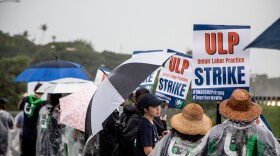It's National Blood Donation week, but the Blood Bank of Hawaii is always collecting to increase its supply that's used across the state.
The blood bank has less than a day's supply of Type O blood, which is the universal blood donor. Type O-negative blood is used in emergency situations.
"Every time there's a big holiday, we see in the fire department more accidents, we see people who need blood," Honolulu Fire Department Lifesaver Club Coordinator Carl Otsuka said.
Otsuka takes the lead in setting up blood drives for the department.
He’s been donating since high school, and most recently visited the Blood Bank of Hawaii's Young Street Donation Center on Thursday.
"If we can get the blood bank's backstock of blood products up, we'll be ready for anybody who does need it," Otsuka said. "It's like an insurance policy."

But blood isn’t just needed locally. The Blood Blank of Hawaii is part of the Blood Emergency Readiness Corps, which includes 30 blood centers around the country. The partnership started in 2021, and was most recently activated in May for the shooting in Uvalde, Texas.
"Blood banks responded to support that community there in Texas," Fred McFadden, the director of donor services for the Blood Bank of Hawaii, said. "The beauty of that is, God forbid something happened here (like a) natural disaster or man-made, we would have the support from blood banks throughout the nation to support us in the time of need. So blood banks work together to make sure that all communities have the blood they need when they need it."
It works on a rotating schedule. Every third week, the Blood Bank of Hawaii reserves 10 units of O-negative blood units.
"If we are called to send those anywhere in the nation, we do that immediately, and if it's not needed, then, of course, it stays local for patients here in Hawaiʻi," McFadden said.
McFadden reports that about 20% of the bank's supply comes from high schools and colleges. But because the pandemic limited in-person events and schooling, there was a dip in support.
"We were really challenged for blood, but so now they're back and we're so grateful," McFadden said. "They're booking their blood drives on campus again."
More information can be found online at BBH.org.




